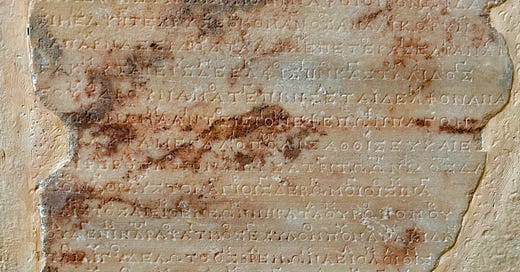What kinds of music have been heard across millennia of human history? The absence of methods of recording makes it impossible to know for certain. But we can get some idea of the kinds of sounds that musical instruments are likely to have made. The archaeological record reveals object that give us a reasonable basis for reconstructing the kind of sounds that would have rung in the ears of the people who played or heard them. A recent book by Graham Lawson, Sound Tracks, that I have just reviewed, compiles a great variety of such remains, and considers the sounds that people in prior centuries - and all the way back to prehistoric times - would have heard.
Music, rather than sounds, only emerges with the advent of notation. It’s possible to reconstruct the precise melody attached to the words of the short song on the marble ‘Seikilos column’ from around AD 200 inscribed in Greek, indicating a tune that sounds not greatly dissimilar to Gregorian plainsong from the ninth and 10th centuries (see image and hear the song here). The column uses a notation invented in the fifth century BC. It is well understood thanks to the survival of copious writings on music by authors from classical antiquity. The column was discovered during the construction of the Ottoman railway in Turkey around 1866, and eventually ended up in the house of the chief engineer Edward Purser. Not understanding its value, Mrs Purser had the bottom sawn off straight so that it could serve as a flowerpot-stand!
Such documents of notated ancient Greek music have increasingly come to light since the 16th century, and around 60 are now widely available. The most ample survivals are two inscriptions on stone from Delphi that date to 127 BC (photo above), which contain substantial remains of notated music representing two hymns sung by choirs in honour of the god Apollo. The melodies which can be read, played, and sung from the notation demonstrate significant parallels to a shared European musical idiom, suggesting the controversial and exciting conclusion - one that I have argued for in academic papers - that Western musical traditions may be traced back all the way through the world of Rome to the music of ancient Greece.





Your posts are so lovely. Remind me, why do I need to go into financial and spiritual debt to hear you teach this, when I could just follow you on Substack?